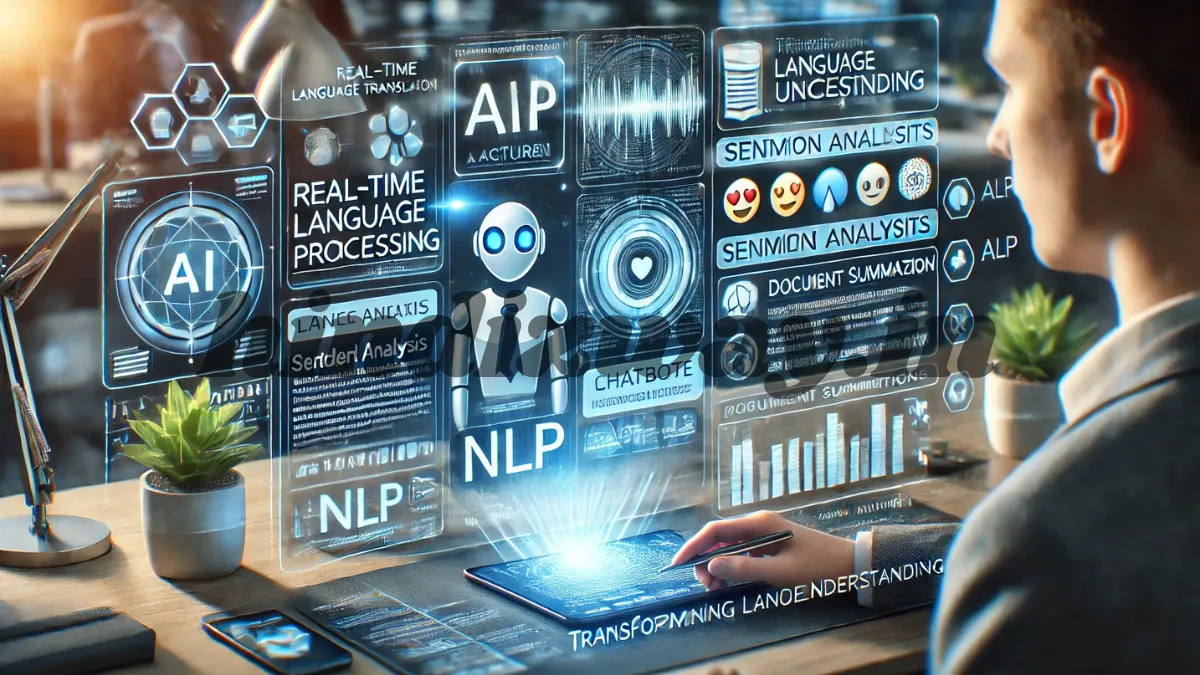NLP in AI: Uncover the significance of Natural Language Processing (NLP) in Artificial Intelligence (AI) for 2025. Explore its importance, recent advancements, real-world applications, challenges, and future prospects in this comprehensive guide.
Understand NLP in AI
Natural Language Processing (NLP) is a pivotal field within Artificial Intelligence (AI) that focuses on enabling machines to comprehend, interpret, and generate human language. As 2025 approaches, NLP has reached new heights, transforming communication, enhancing data-driven insights, and powering intelligent systems across various industries. From virtual assistants like Alexa and Siri to sentiment analysis tools used in market research, NLP has become an indispensable part of our daily lives.
This article provides an in-depth understanding of NLP in AI, its key components, applications, recent developments, challenges, and future trends. Whether you are an AI enthusiast or a professional seeking to understand NLP’s practical implications, this guide will equip you with valuable insights.
What is NLP in AI?
Natural Language Processing (NLP) bridges the gap between human language and machine understanding. It enables computers to interpret, analyze, and respond to text and speech in a way that mimics human comprehension. NLP combines computational linguistics, machine learning, and deep learning techniques to enhance communication between humans and AI systems.
Key Components of NLP
- Tokenization:
Splitting text into smaller units, such as sentences, phrases, or individual words, to facilitate processing. - Lemmatization and Stemming:
Reducing words to their base or root forms. For example, “running” becomes “run” during lemmatization. - Parsing:
Analyzing sentence structures to understand grammatical relationships between words. - Named Entity Recognition (NER):
Identifying and categorizing key entities, such as names, places, organizations, and dates. - Sentiment Analysis:
Determining the sentiment or emotional tone within a piece of text, whether positive, negative, or neutral. - Stop Word Removal:
Filtering out common, non-informative words such as “the,” “is,” and “in” to focus on more meaningful terms.
Importance of NLP in AI
Why NLP Matters in 2025
In today’s world, NLP drives the functionality of various AI-powered solutions. Its significance lies in the following areas:
- Enhanced Communication: NLP allows machines to interpret and generate human language, improving human-computer interactions.
- Data-Driven Insights: NLP helps businesses extract valuable information from unstructured data, such as social media posts, customer reviews, and emails.
- Automation of Repetitive Tasks: NLP powers chatbots and virtual assistants that automate customer service, freeing up human resources for higher-level tasks.
- Improved Decision-Making: NLP-based systems provide insights that enable data-driven decision-making in industries like healthcare, finance, and e-commerce.
Real-Life Examples of NLP Applications:
- Virtual assistants (e.g., Siri, Google Assistant)
- Language translation tools (e.g., Google Translate)
- Chatbots for customer support
- Spam email detection
- Sentiment analysis for market research
Recent Advancements in NLP (2025)
1. Multimodal NLP
Multimodal NLP models are capable of processing text, images, and audio simultaneously, enabling more accurate and context-aware responses. For instance, systems can now analyze video content alongside textual descriptions, making them more versatile.
2. Real-Time Emotion Detection
Recent NLP models have advanced in detecting emotions and sentiments from text, allowing real-time analysis of customer feedback, mental health assessments, and personalized marketing.
3. Few-Shot and Zero-Shot Learning
Few-shot and zero-shot learning models significantly improve NLP efficiency by enabling systems to perform new tasks with minimal or no training data. This reduces the need for large datasets and expedites model training.
4. Multilingual NLP Models
In 2025, NLP models have become more adept at handling multiple languages simultaneously. These models can translate, interpret, and generate content in various languages, enhancing global communication.
5. Contextual Understanding with Transformer Models
Transformer models like GPT and BERT have set new benchmarks in NLP by understanding context at a deeper level. These models can generate coherent, contextually relevant responses, improving the performance of chatbots, search engines, and language translation tools.
Applications of Natural Language Processing in Key Industries
1. Healthcare Industry
NLP has revolutionized healthcare by enhancing the way medical professionals manage patient records and make clinical decisions.
Key Applications in Healthcare:
- Clinical Documentation: NLP-powered systems can automatically summarize lengthy patient records.
- Disease Diagnosis: NLP assists in identifying symptoms from electronic health records.
- Drug Discovery: NLP tools analyze scientific literature to uncover potential drug candidates.
2. Finance and Banking
NLP plays a crucial role in automating financial operations and enhancing fraud detection mechanisms.
Key Applications in Finance:
- Fraud Detection: NLP models analyze transaction patterns and detect unusual behavior.
- Sentiment Analysis for Investments: NLP helps investors make informed decisions by analyzing news articles, financial reports, and social media trends.
- Chatbots for Customer Service: AI-powered chatbots handle customer queries and improve response times.
3. E-Commerce
The e-commerce sector benefits greatly from NLP-driven insights to enhance the shopping experience.
Key Applications in E-Commerce:
- Product Recommendations: NLP analyzes user search patterns to provide personalized product recommendations.
- Review Analysis: NLP tools assess customer reviews to understand preferences and detect recurring issues.
- Chatbots: Virtual shopping assistants powered by NLP guide users through the buying process.
4. Education
NLP has transformed the education sector by making learning more personalized and efficient.
Key Applications in Education:
- Automated Grading: NLP systems evaluate essays and assignments, reducing manual grading efforts.
- Personalized Learning: NLP tools recommend study materials based on a student’s learning history.
- Language Learning Tools: NLP powers language learning apps, offering real-time feedback and corrections.
5. Social Media and Marketing
NLP enables marketers to gauge public sentiment and optimize their strategies based on audience insights.
Key Applications in Marketing:
- Social Listening: NLP monitors social media platforms to track brand mentions and customer opinions.
- Sentiment Analysis: NLP analyzes customer feedback to identify positive and negative sentiments.
- Content Generation: NLP tools assist in generating social media posts and advertisements.
Challenges in Natural Language Processing Development
1. Ambiguity and Context Sensitivity
Human language is often ambiguous, with many words having multiple meanings. For example, the word “bank” can refer to a financial institution or a riverbank. NLP models must decipher the intended meaning based on context.
2. Bias in Training Data
Training data often contains biases, which can lead to biased outcomes in NLP applications. Ensuring fairness and eliminating biases remains a significant challenge for developers.
3. Resource Intensity
Deep learning models used in NLP require substantial computational power, making them resource-intensive. This can be a barrier for organizations with limited infrastructure.
4. Handling Multilingual Data
While multilingual models have improved, ensuring consistent performance across different languages remains a complex task due to linguistic nuances.
The Future of NLP in AI
As NLP technology continues to evolve, several trends are expected to shape its future:
1. Hyper-Personalized Interactions
NLP systems will become more adept at delivering hyper-personalized experiences by understanding user preferences, history, and context.
2. Smarter Conversational AI
Future conversational AI models will be capable of holding more natural, human-like conversations, making interactions with virtual assistants indistinguishable from real human interactions.
3. Enhanced Cybersecurity
NLP will play a crucial role in cybersecurity by detecting phishing attempts, fake emails, and fraudulent activities through text analysis.
4. Real-Time Language Translation
Advancements in NLP will lead to real-time, highly accurate language translation tools that break down communication barriers in international collaborations.
FAQs for Natural Language Processing
1. What is NLP in simple terms?
NLP is a technology that enables computers to understand, interpret, and generate human language in a meaningful way.
2. How is NLP different from speech recognition?
Speech recognition converts spoken language into text, while NLP processes and interprets the text to extract meaning.
3. What is sentiment analysis in NLP?
Sentiment analysis is a technique used to determine the emotional tone of a piece of text, identifying whether it is positive, negative, or neutral.
4. What are the practical uses of NLP in everyday life?
NLP is used in applications such as email spam filters, virtual assistants, auto-correct features, and customer feedback analysis.
5. Why is NLP important for businesses?
NLP helps businesses automate processes, improve customer service, and gain valuable insights from large volumes of unstructured data.
Conclusion | Natural Language Processing
Natural Language Processing (NLP) continues to redefine the possibilities of human-computer interaction. In 2025, advancements in NLP will further enhance the capabilities of AI systems, making them more accurate, context-aware, and efficient. From healthcare and finance to education and e-commerce, NLP is poised to revolutionize industries by enabling machines to understand and generate human language seamlessly. Staying informed about these developments will help individuals and organizations leverage NLP to its fullest potential and stay ahead in an increasingly AI-driven world.
Read More Articles like NLP in AI:
- Bihari Gyan Free Recharge
- Happy New Year Free Recharge: How to Claim and Maximize Your Benefits
- Call History of Any Number 2025: The Ultimate Guide to Access Call Details
- Khas Update.com Call Details: Comprehensive Guide to Access Call Information
- JJMR Site Free Recharge 2025: Uncovering the Myths vs. Reality & How to Protect Yourself







